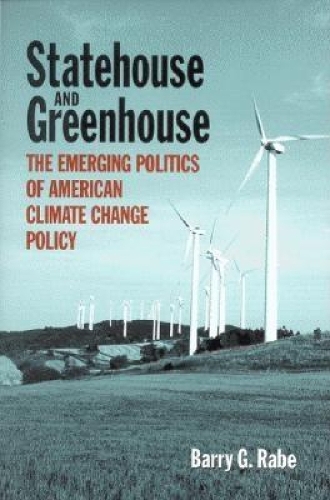
Statehouse and Greenhouse: The Emerging Politics of American Climate Change Policy
(Paperback)
Publishing Details
Statehouse and Greenhouse: The Emerging Politics of American Climate Change Policy
By (Author) Barry G. Rabe
Bloomsbury Publishing PLC
Brookings Institution
17th February 2004
United States
Classifications
Professional and Scholarly
Non Fiction
Climate change
363.738
Physical Properties
Paperback
232
Width 151mm, Height 228mm, Spine 15mm
367g
Description
Few public policy issues seem as hopeless as global climate change. Mounting evidence shows that accumulating levels of greenhouse gases are already beginning to alter climate patterns, and this only intensifies concerns about long-term dangers. In turn, potential policy remedies appear feckless. Prospects for implementation of the Kyoto Protocol are highly uncertain even among nations that have ratified the accord. At the national level, the United States, which is the leading source of greenhouse gases, remains completely disengaged from the Kyoto process. Increasingly, other developed nations severely criticize the United States for its perceived failure to engage this issue. But a quiet yet growing trend for the state governments to assume a leadership role in reducing greenhouse gases suggests that a far more robust process for American policy development is under way. Conventional analyses assume that climate change can only be addressed by international regimes and national governments. However, many states have developed active multifaceted programmes to address carbon dioxide, methane and other greenhouse gases within a diverse array of policy sectors, including energy, environmental protection, transportation, natural resources and agriculture. In this book, Barry G. Rabe examines this evolving policy process. He devotes particular attention to the factors prompting so many states to take significant steps toward greenhouse gas reduction. These states cut across regions and traditional partisan divides; agency-based policy entrepreneurs appear to be central players in developing policy ideas and forming viable coalitions. Rabe argues that this recent flurry of experience can move the debate over climate change from hyperbole to the realm of what is politically, economically and technically feasible. He also offers alternatives for future policy development. These would build on recent state initiatives and actively engage them in long-term policy formation and implementation.
Reviews
"The burgeoning literature on environmental federalism has a strong new book to add to its ranks. Rabe's STATEHOUSE AND GREENHOUSE offers an engaging look at the development of climate change policy at the subnational level in the U.S.... Highly recommended." M.C. Stephan, Washington State University, Choice, 11/1/2004
|"This well volume by a professor of environmental policy is an essential book for students of environmental and energy policy." Educational Book Review, 9/1/2004
|"make[s] important contributions to the growing literature on comparative environmental policy....Rabe has written an analytically insightful and approachable book that serves various audiences. It has lessons for those concerned with the robustness and fundamental nature of American federalism and bottom-up policymaking" Daniel Mazmanian, Publius, 9/22/2006
Author Bio
Barry G. Rabe is a professor of environmental policy in the School of Natural Resources and Environment and professor of public policy in the Gerald R. Ford School of Public Policy at the University of Michigan. He also directs the university's new Program in Environment. Rabe is the author of two previous Brookings books, When Federalism Works and Beyond NIMBY.
